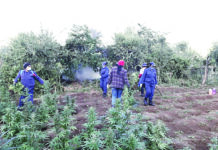Minister of Finance Neal Rijkenberg has revealed that the country has received about E86 million from the United States (US) government as part of a support package linked to the accommodation of convicted foreign nationals deported from that country.
He said the funds cannot be used for general government spending and do not form part of the national revenue to be channelled into unrelated areas. Instead, they are specifically earmarked for strengthening the country’s criminal justice system, enhancing anti-crime initiatives, and improving border and migration management.
The revelation brings clarity to months of speculation that has engulfed the country since the first batch of deportees arrived in July, prompting intense scrutiny from Parliament, civil society and international media.
In an interview yesterday, Rijkenberg said the funds — a US$5.1 million grant — are not a direct payment for hosting deportees, but rather support long-standing national capacity gaps.
“The grant will, amongst other things, focus on counter-narcotics efforts, border management and security, as well as addressing issues related to migration, trafficking, and smuggling operations,”
he explained, noting that Cabinet had formally approved the funds.
This is the first definitive confirmation from government since global media reports in August suggested that Eswatini would receive financial support in exchange for accepting deportees under Washington’s revived third-country deportation policy.
The policy, reinstated by a US Supreme Court ruling in June, allows the US government to relocate deportees to a third country with which they have no nationality, family ties or geographical connection.
Under this system, Eswatini has so far received two groups — five deportees in July, and another 10 in October — all convicted of serious crimes in the US. One of them, Isaac Etoria, has since been repatriated to Jamaica.
Their arrival sparked a national and international firestorm as Members of Parliament demanded clarity on whether formal agreements existed, what risks and benefits were involved, and how the arrangement aligned with national security.
Prime Minister Responds
Prime Minister Russell Dlamini acknowledged that limited disclosure may have fuelled public anxiety, but insisted the decision was necessary to safeguard national security.
He stressed that the transfer formed part of international cooperation obligations and that the men would eventually be returned to their countries of origin following diplomatic engagements.
Global media outlets — BBC, CNN, Reuters, The New York Times, NBC, Al Jazeera, SABC and Newzroom Afrika — all carried the story, highlighting the unusual nature of a small African nation receiving foreign convicts with no ties to the country.
Human Rights Watch Raises Alarm
In September, Human Rights Watch (HRW) intensified the debate by claiming it had reviewed an agreement suggesting Eswatini would accept up to 160 deportees in exchange for a US$5.1 million capacity-building package.
Government did not immediately issue detailed clarification, further fuelling speculation.
Melusi Simelane, Programme Manager at the Southern Africa Litigation Centre (SALC), said the minister’s disclosure exposes a sharp disconnect within Cabinet and deepens concerns over transparency and governance.
He argued that the minister’s statement contradicts earlier assurances by the PM and raises constitutional questions that Parliament must urgently address.
Parliamentary Scrutiny Called For
Simelane said the matter — which SALC is challenging in court — highlights what civil society views as “human trafficking” and alleges that government violated constitutional requirements by entering into an international agreement without following due process.
According to him, Section 69(2) of the Constitution places Cabinet, collectively under the PM, under parliamentary scrutiny. He insisted this duty is now more urgent given the contradictions.
“The PM vehemently denied receiving money as part of this deal, so Parliament needs to summon the PM for answers,”
he said.
He further suggested that Parliament should consider establishing an ad hoc committee to determine “who knew what and when,” saying Treasury cannot request appropriation without clarity on the origins of the funds.
“That is what open government is about: accountability.”
Legal Challenge Strengthened
Simelane said the minister’s revelation strengthens SALC’s court case, which seeks to have the deportee arrangement declared unconstitutional, arguing that it amounts to an international agreement requiring parliamentary approval under Section 238(2).
He added that the involvement of several ministries — foreign affairs, home affairs, correctional services and treasury — shows the matter goes beyond a simple administrative decision.
He said the Executive must explain how an agreement “of this magnitude” was concluded without complying with Section 236, which outlines how public institutions may enter binding agreements with foreign governments.
The High Court heard SALC’s challenge on November 3 and has not yet delivered judgment. Simelane said the organisation is considering its legal options in light of the disclosed information.
“While we await the court’s ruling, we are exploring options, including approaching the courts to consider this new damning piece of evidence,”
he stated.









